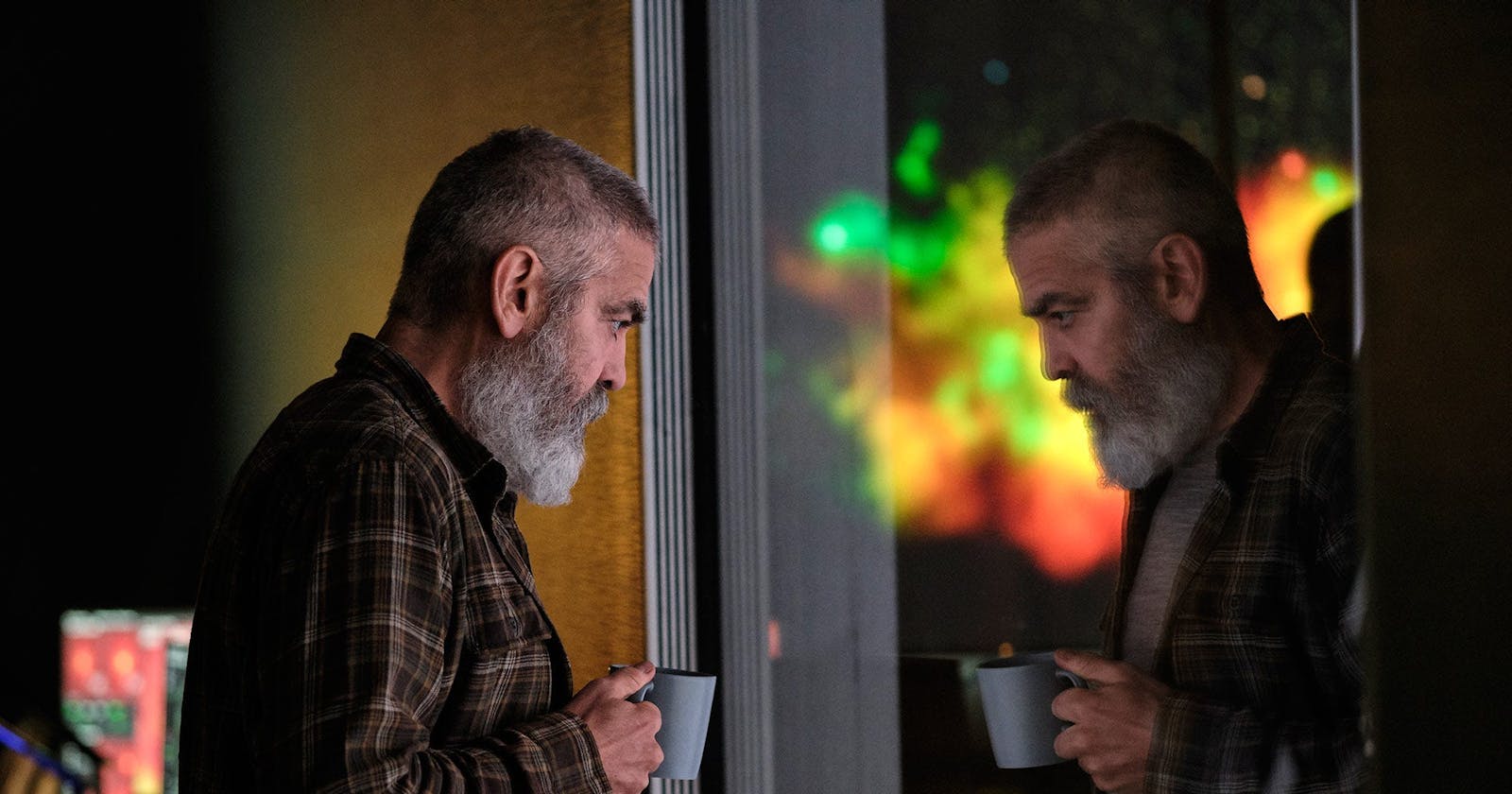As writers, it’s our responsibility to tell a complete story, not outsource our job to the audience.
I’ve been pondering this question lately: are writers obligated to tell a complete story?
While there’s a place for ambiguity, in this writer’s personal opinion, writers trying to be ambiguous more often end up just telling an incomplete plot, and their story lacks the satisfaction they were likely going for. This latest George Clooney film, based on the novel by Lily Brooks-Dalton and adapted by Mark L. Smith, is a perfect example of that phenomenon — and as such fails to deliver emotional punch — because it doesn’t tell you what’s really going on.
Before we dive in, this isn’t a movie review. In this case, The Midnight Sky is simply a catalyst for writing about something that’s been on my mind. So, let’s drop a couple definitions.
- When I say plot, I’m referring to the events and actions the writer puts together to pull us through the experience.
- When I say story, I’m referring to the meaning conveyed by the writing; it’s basically the intersection of the characters and their journeys colliding into the plot.
Now allow me to get on my soap box.
In my opinion, it’s our job as writers to tell a complete plot at a bare minimum. I think it’s fine, and can add some intrigue, to sprinkle in some ambiguity to the story or character arcs. Hell, ambiguity can still be satisfying, but in my opinion, that’s such a difficult feat to pull off that it isn’t even worth risking undercutting the satisfaction of your entire story.
As writers, we came up with our plot, our characters, our world, and how those all come together as a story. We should have a clear opinion of how it all goes, and therefor all the constituent parts of our story should be complete.
Beginning with the ending
Often times, when I’ve felt most let down by ambiguous stories, it was because the writer had created an interesting world and plot, and I’d gotten very invested in it. Then, when the writer leaves me hanging at the end, I just feel like I’ve been tricked, like they’re hiding the ending from me. Again, sometimes it works, but more than often it doesn’t. In my opinion, it’s our job as writers to take a stand and have an opinion about how the ending of our story is supposed to take place, not just leave it completely open for the audience to do our jobs for us.
This experience is different in movies vs TV, but I’m just talking movies for this article.
But first, let’s drill down into an ambiguous ending that actually feels satisfying: Inception.
Ambiguous vs. open to interpretation, or why Inception’s ending is good where others are not
I think moviegoers, almost universally, enjoyed Christopher Nolan’s Inception, including its ambiguous ending. I know I loved it and have watched it at least five times over the years.
Only I would argue Inception’s ending is not actually ambiguous, but rather it’s open to interpretation. This all comes down to the fact that the ending, and how you interpret it, will be based on the opinions you formed through the movie, specifically around how totems work, a small but important detail in the plot.
The ambiguity in this case doesn’t feel arbitrary at all, because it’s actually putting the power back into your hands as the audience. This ending expertly weaves in elements of the plot in order to tie the ending to the story and the plot and leave us feeling satisfied. Also, the little detail that the totem wobbles right before cutting to black is that little cherry on top: it makes us as an audience feel smart for remembering that’s how his totem works, and it gives us a clear indication of what the totem is going to do, leaving it to us to determine what that actually means, rather than leaving us without any clue as to what happened.
The key to this ending is that Nolan leaves us just enough information and details so that we can easily construct a satisfying ending for ourselves, in a way where we feel smart/good for doing so. We don’t have to go to great lengths to find meaning in this ending; likely, by the end of the movie, we already have an idea or opinion of what the relevant details mean. The ending leaves a few possibilities, but based on your perceptions/opinions during the movie, only one of those possibilities is likely to stand out to you. Hence, you don’t actually have to choose your ending when Inception cuts to black, rather you’ve already chosen it by the end. This is why it works.
This is just my opinion, and if you think there are other good ambiguous endings, drop them in the comments.
Looping back around to the beginning
Let’s bring it back to the movie that sparked this article in the first place: The Midnight Sky. Should be obvious, but spoiler alert starting now.
Another common place writers like to insert ambiguity is in the backstory, or the story before the story. The Midnight Sky starts exactly like this, only unlike many stories that start on an ambiguous note, this one fails to actually make it any clearer by the end. This is the cornerstone of why the movie falls flat — in my opinion — and why I wanted to write this article.
Generally, we writers like to drop you into the action as soon as possible, and in doing so, we’ll often start without any details so we can pull the audience in right away. But usually, we’ll explain at least some, if not all, of the things we skipped over once we’re firmly in the story.
The Midnight Sky is set in 2049 during/immediately after a cataclysmic event that renders Earth uninhabitable through radiation. In the story this is simply referred to as “The Event” and not once is it actually explained at all.
Here’s why this is a problem in this story.
There’s no reason not to tell the audience what happened. There’s nothing in the story that relies on the ambiguity of this event. Ambiguity needs to have purpose in order to work, otherwise it feels lazy and unsatisfying, hence the title of this article.
It’s also not a complicated thing to explain. Writers are legitimately wary of the dreaded “exposition dump” which is often a good enough reason to leave some things ambiguous, at least enough so that you can dole out the information over the course of the story. But in this case, this event isn’t complicated enough to be legitimately worried about an exposition dump. One or two lines of dialogue, and it’s explained.
Finally, there are real stakes that aren’t given any weight, because the writer refuses to give us any information. At the beginning of the movie, all the people are supposedly evacuating somewhere at the beginning of “The Event” while the main character, played by Clooney, stays behind. Eventually, we learn that they’ve evacuated underground to a “temporary” living space (that’s the exact word they used in the movie). So, when two of the crew members aboard the Aether spaceship (that we’ve been following for half the movie) decide to disembark back to Earth instead of staying on the ship and going back to the livable moon they found before the story began — and they decide to do so to supposedly try to find their families — we have virtually no investment in their journey at this point. Because we have no idea of the real state of the surface of the planet or how the “survivors” are supposed to be living, it’s hard to feel much of anything for these two people who, as far as we can tell, are basically just committing suicide with little real justification.
Okay, those were some long sentences, so kudos to you for sticking through it.
Let’s put a bow on this
The main reason I wanted to write this article was how The Midnight Sky handled ambiguity throughout its story. While we often think of ambiguous endings when we think of ambiguous storytelling, the way stories handle ambiguity throughout their plots is also important. The Midnight Sky, in my opinion, tells an incomplete plot, and therefor an incomplete and unsatisfying story.
The movie is also hampered by the fact that it’s incredibly bleak which means the audience need satisfaction even more than usual, and the ambiguity just further sucks out any satisfaction that could be had.
As writers, I strongly believe it’s our responsibility — really our job description — to provide complete plot-lines (and, by extension, worlds) at a minimum, because it’s really impossible to have a satisfying and complete story when key elements of your plot or world are unexplained. It’s our job to come up with and tell a complete plot and world/backstory without falling into exposition dumps or other story-telling techniques that are lazy on the other side of the spectrum. The plot, characters, and story we create are ours, and we should own 100% of them by making sure they’re complete.
Failing to do that is just lazy.
Thoughts? Disagree with me? Let me have it in the comments. ;)

